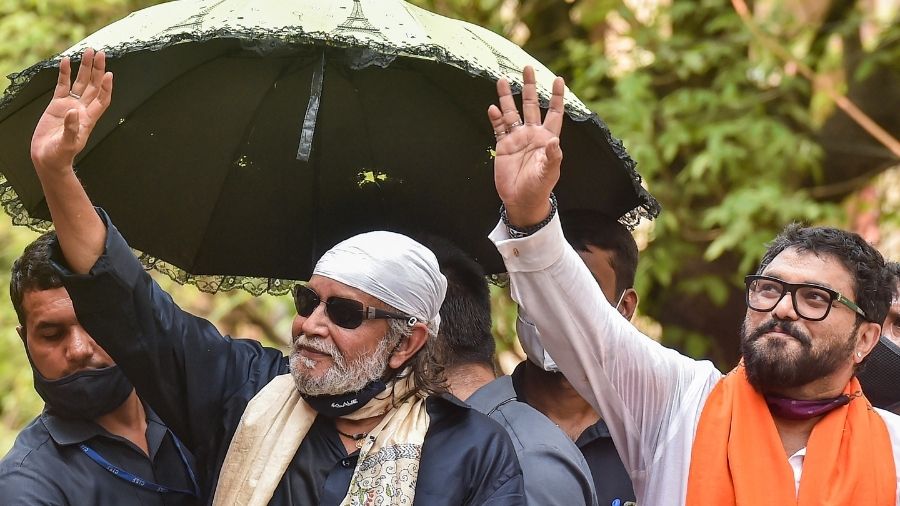
Star power: Celebrities and Bengal polls The wall between glamour and politics is thin

The wall between glamour and politics is thin. Cricket being extremely popular, a cricketer-turned-politician is not an alien concept in the subcontinent. While Ronald Reagan and Arnold Schwarzenegger are often cited as instances of film stars turning into politicians, the former Guatemalan president, Jimmy Morales, and the former Philippine president, Joseph Estrada, are also notable examples in this regard. Bollywood’s tryst with Indian politics is not a recent phenomenon either. Celluloid and Dravidian politics have been inseparable — five out of seven Tamil Nadu chief ministers from Dravidian parties so far have been from Tamil cinema.
According to P. Eric Louw of the University of Queensland, the gap between politics and entertainment has narrowed. Celebrities are in the public gaze for years and that can influence voting behaviour. A new political entrant celebrity might be seen to invigorate politics with new ideas. Critical theorists such as Douglas Kellner of the University of California, however, have employed the concept of the ‘media spectacle’ to suggest that the emphasis on celebrity replaces the complexities of policy with symbolic gestures. Some celebrities, of course, take refuge in electoral politics in the declining stages of their career. But Amitabh Bachchan illustrates that sometimes a star’s stint in politics may be surprisingly short-lived, even if it has a triumphant beginning such as defeating a political stalwart like Hemwati Nandan Bahuguna from Allahabad. Given that star candidates have been fielded in truly challenging seats in the Bengal elections, the objective might be to recreate Bachchan-Bahuguna moments. But not every star is the same, social structures differ, and every election is unique.
A century-old history depicts that the 1920 presidential campaign of Warren Harding in the United States of America was endorsed by film stars like Al Jolson, Lillian Russell, Douglas Fairbanks and Mary Pickford. In 1960, John F. Kennedy received the support of members such as Sammy Davis Junior and Dean Martin. How, then, do celebrities influence elections? Unfortunately, the academic literature on celebrity politics and celebrity endorsement is often superficial and anecdotal. The most conspicuous example of celebrity endorsement in recent history is that of Oprah Winfrey, one of the world’s most well-known faces, endorsing Barack Obama prior to the 2008 US Democratic Presidential Primary. Based on some methodological derivation, C. Garthwaite and T. Moore from the University of Maryland estimated that the endorsement was responsible for 1,015,559 votes for Obama.
An Indian example may be traced back to the 1996 Tamil Nadu elections when, in a televised message, Superstar Rajinikanth said: “Even god cannot save Tamil Nadu if Jayalalithaa is re-elected to power.” Many believe that one-liner sealed Jayalalithaa’s fate in that election. However, not every celebrity is eager to take active part in politics. During a 1990 Senate election in his home state of North Carolina, Michael Jordan, a superstar by then, refused to endorse Democrat Harvey Gantt, an African American, against the incumbent Republican, Jesse Helms, known to be a notorious racist. “Republicans buy sneakers, too,” Jordan is known to have famously said. For the time being, many celebrities might be believing that only politicians of their preferred party are buyers of sneakers.




.png)
0 Response to " Star power: Celebrities and Bengal polls The wall between glamour and politics is thin"
Post a Comment
Disclaimer Note:
The views expressed in the articles published here are solely those of the author and do not necessarily reflect the official policy, position, or perspective of Kalimpong News or KalimNews. Kalimpong News and KalimNews disclaim all liability for the published or posted articles, news, and information and assume no responsibility for the accuracy or validity of the content.
Kalimpong News is a non-profit online news platform managed by KalimNews and operated under the Kalimpong Press Club.
Comment Policy:
We encourage respectful and constructive discussions. Please ensure decency while commenting and register with your email ID to participate.
Note: only a member of this blog may post a comment.